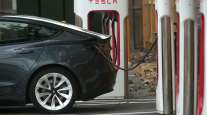Bloomberg News
Canada Matches US Subsidies to Win VW EV Battery Plant

[Stay on top of transportation news: Get TTNews in your inbox.]
Canada Prime Minister Justin Trudeau’s government agreed to subsidies that may top C$13 billion ($9.7 billion) over a decade to land an electric vehicle battery plant by Volkswagen AG, the company’s first gigafactory outside Europe.
The money is provided through an unprecedented contract negotiated by Trudeau’s industry minister, François-Philippe Champagne. Canada will provide annual production subsidies as well as a grant toward the factory’s capital cost — effectively matching what the German automaker could have received via the Inflation Reduction Act if it had located the plant in the U.S., according to government officials.
The deal offers a stark example of how the U.S.’s trading partners are trying to keep pace with the financial incentives contained in climate legislation signed by President Joe Biden last year. The factory, to be part of Volkswagen’s PowerCo unit, will likely be the largest manufacturing site in Canada, the minister said.
Champagne and other government officials believe the financial aid for Volkswagen is necessary to protect Canada’s position in the North American auto sector as it moves away from internal combustion engines, and to ensure the country isn’t seen as merely a provider of critical minerals but also a source of advanced manufacturing and clean technology. The government is also in talks on financial help for a plant that LG Energy Solution and Stellantis NV have said they’re planning to build in Ontario, the minister said.
“This is about us seizing generational opportunities,” Champagne told Bloomberg News in an interview. “This is about raising our level of ambition.”
The minister said the plant will cost about C$7 billion to build, will have a footprint equal to 350 football fields, and will create thousands of jobs in the region around St. Thomas, the southern Ontario city where it will be located, about two hours northeast of Detroit.
The economic value of bringing one of the world’s largest automakers to Canada for the first time — with the supply chain spinoffs it will create — is worth far more than the cost of the subsidies to the government, Champagne argued.
Still, the size of the incentives is striking. The production support alone is expected to range from C$8 billion to C$13 billion over 10 years, depending on how much the plant produces and what happens with U.S. policy. The contract is written so that Canada’s production subsidies will stay in place only as long as the Inflation Reduction Act is in force. If the U.S. reduces its incentives for clean manufacturing, Canada’s will go down proportionally.
On top of that, Canada is offering about C$700 million in capital expense grants to Volkswagen through its Strategic Innovation Fund. And there may be more money from Ontario’s provincial government, though Champagne declined to go into detail.
The Inflation Reduction Act, despite its name, is in fact a law that enacts large-scale subsidies for low-carbon industries, particularly through production tax credits. Those incentives are generous and broadly available, meaning they could go beyond the official $370 billion in estimated costs, depending on how widely they’re used.

Volkswagen EVs at a fuel-cell gigafactory in Salzgitter, Germany. (Krisztian Bocsi/Bloomberg News)
The legislation has put massive pressure on Canada and other U.S. trade partners to provide money or lose out on lucrative new investments in the green economy. In a speech in Washington last week, Canadian Finance Minister Chrystia Freeland warned that democracies need to avoid a “race to the bottom” in corporate subsidies that could erode their tax bases and social safety nets.
The Volkswagen deal in Canada also raises the question of how much financial help other automakers and battery producers might be able to get. Last year, LG and Stellantis announced a $4 billion joint venture in nearby Windsor, Ontario, across the border from Detroit.
“We are negotiating,” Champagne said when asked if the LG-Stellantis plant would receive the same incentive package from Canada. He pointed out the government has promised to level the playing field with the U.S.
Champagne added that the sheer size of the subsidies means Canada has to be selective. Asked how many vehicle battery plants the country can realistically support, the minister said it’s going to be “at best, a few of them.”
This money belongs to Canadians. Not to a foreign corporation. Not to Justin Trudeau.
How much of Canadians' money is he giving to this foreign corporation?
How many jobs?
How much is the cost per job?
How much? https://t.co/DmNxeGnFDf — Pierre Poilievre (@PierrePoilievre) March 15, 2023
Trudeau’s Liberal government is likely to face some backlash over the deal. It has already taken some criticism for not giving more detail on the cost. “How much of Canadians’ money is he giving to this foreign corporation?” Conservative Leader Pierre Poilievre tweeted shortly after the factory was announced last month. “How much is the cost per job?”
Want more news? Listen to today's daily briefing above or go here for more info
Canadians will understand why the government put up so much funding to attract Volkswagen, Champagne said. He also noted the money won’t start flowing for many years, given it’s tied to production at a factory that still needs to be built.
The industry minister argued the economic impact of the plant in its first five years will equal the entirety of government funding for it. Over the next 30 years, the plant will generate more than C$200 billion in value for Canada, he said.
“You have to look at what others are doing, and particularly in our case, what the U.S. is doing,” he said. “What’s the cost of inaction?”




